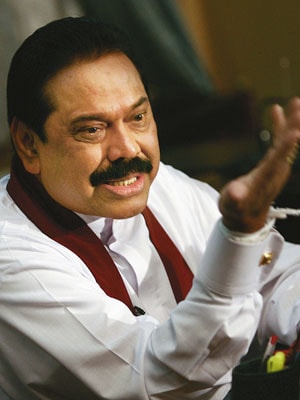
Should India Bat for Tamils in Sri Lanka?
With Tamils in Sri Lanka beaten on all fronts, the time has come for India to intervene decisively
Somebody once said democracy is the right to choose your dictator. For the minority Tamils in Sri Lanka, the Presidential election in late January presented such a baffling dilemma. Should they vote for the man who ordered a bloody war on their homeland or for the military general who actually led the troops into their fields? In the end, most Tamils stayed home on the poll day unable to fathom who was the lesser evil.
Their paralysis helped the political commander. President Mahinda Rajapaksa, who had gambled by calling a snap election two years ahead of schedule, won a decisive mandate to run the island nation for another six years starting November 2010. The Sinhalese majority rewarded him for vanquishing the once invincible Liberation Tigers of Tamil Eelam (LTTE), a ruthless guerrilla force that led a separatist campaign in the Tamil parts for more than three decades.
With Rajapaksa’s re-election, both the Tamils and neighbouring India, which plays an inevitable but a hesitant role in the happenings on the tear-drop island, are at the crossroads. They now have to shift gears and engage the 64-year-old lawyer-turned-politician to find a solution to the festering Tamil problem.
At the peak of his power now, Rajapaksa has no political compulsion to listen to them. He has defeated the LTTE, won the executive presidency without the Tamil vote and has won international support, overt or tacit, for his military solution. There is, of course, this small matter of a war crime investigation against him, but he can count on countries such as China to veto any move at the United Nations to penalise him.
On the other hand, the Tamils are at their lowest point. With LTTE gone and the moderate Tamil leadership filled with weaklings, they don’t have anybody to send to talk to the President. “The Tamils are confused,” says N. Sathiyamoorthy, director of the Chennai chapter of Observer Research Foundation. “They have very low negotiating power and in fact, nothing to offer.” Rajapaksa has repeatedly asked Tamils to come up with a final solution, which they have been unable to do. For a population trained by LTTE not to think of anything but secession, federal solutions are not easy to grasp.
India stopped playing an overt role in Sri Lanka’s affairs in 1991, when LTTE killed its former prime minister, Rajiv Gandhi. A year earlier, it had also seen the principal adversaries, the Sri Lankan government and LTTE, gang up together to oust India’s peacekeeping force from the island and butcher a peace agreement. Stung by this, India reduced its involvement to occasional behind-the-screen interventions. Rajapaksa’s final war against LTTE did get India’s support, but the latter never wanted to admit it publicly.
But now, the time has come for India to get involved deeply and openly. India is the only country that can broker a credible accord between the Tamils and the Sinhalese. Most observers expect a 1987 accord mediated by Rajiv Gandhi to be revived now.
India may already be making its first moves. In addition to giving hundreds of millions of dollars to rebuild war-ravaged areas, India is also set to open a consulate in the Tamil town of Jaffna. The enhanced diplomatic presence will be crucial in winning the support of Tamils for any solution it may help evolve.
India would also want to play a bigger role for its own strategic reasons. China is quite active in Sri Lanka through infrastructure projects and reconstruction aid. “If we don’t step up our presence, we will lose the race to China,” says Professor V. Suryanarayan, senior research fellow at the Center for Asia Studies.
The only ray of hope for the Tamils is the upcoming Parliamentary elections. Unlike the first-past-the-post system for the Presidency, Sri Lanka follows proportional representation for the Parliament. So, Tamils will get a certain number of seats and maybe a role in the government. The President will still remain all powerful, but may need Tamil support for any constitutional changes.
(This story appears in the 30 November, -0001 issue of Forbes India. To visit our Archives, click here.)





